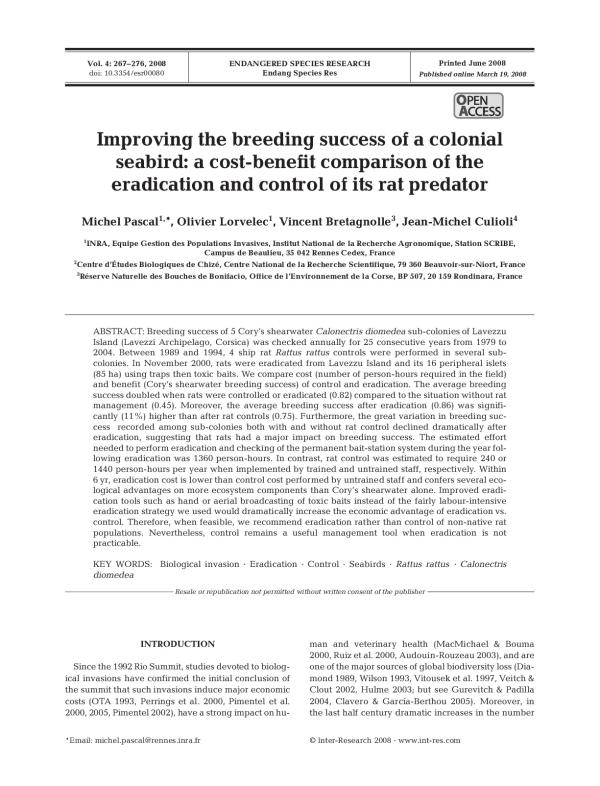Localisation
SPREP LIBRARY
Éditeur
Inter-Research
Année de publication:
2008
Lieu de publication
France
Description physique:
10 p.
Numéro d'appel
[EL]
Type de contenu
Langue
English
Identifiant de dossier:
456
Ancien numéro d'identification PEIN:
81910
Notes générales
Available online
Disponible en ligne
Rubrique(s) thématique(s)
Invasive species - Management - France
Résumé
Breeding success of 5 Corys shearwater Calonectris diomedea sub-colonies of Lavezzu Island (Lavezzi Archipelago, Corsica) was checked annually for 25 consecutive years from 1979 to 2004. Between 1989 and 1994, 4 ship rat Rattus rattus controls were performed in several subcolonies. In November 2000, rats were eradicated from Lavezzu Island and its 16 peripheral islets (85 ha) using traps then toxic baits. We compare cost (number of person-hours required in the field) and benefit (Corys shearwater breeding success) of control and eradication. The average breeding success doubled when rats were controlled or eradicated (0.82) compared to the situation without rat management (0.45). Moreover, the average breeding success after eradication (0.86) was significantly (11%) higher than after rat controls (0.75). Furthermore, the great variation in breeding success recorded among sub-colonies both with and without rat control declined dramatically after eradication, suggesting that rats had a major impact on breeding success. The estimated effort needed to perform eradication and checking of the permanent bait-station system during the year following eradication was 1360 person-hours. In contrast, rat control was estimated to require 240 or 1440 person-hours per year when implemented by trained and untrained staff, respectively. Within 6 yr, eradication cost is lower than control cost performed by untrained staff and confers several ecological advantages on more ecosystem components than Corys shearwater alone. Improved eradication tools such as hand or aerial broadcasting of toxic baits instead of the fairly labour-intensive eradication strategy we used would dramatically increase the economic advantage of eradication vs. control. Therefore, when feasible, we recommend eradication rather than control of non-native rat populations. Nevertheless, control remains a useful management tool when eradication is not practicable.
Programme(s):
Localisation
SPREP LIBRARY
Éditeur
Inter-Research
Année de publication:
2008
Lieu de publication
France
Description physique:
10 p.
Numéro d'appel
[EL]
Type de contenu
Langue
English
Identifiant de dossier:
456
Ancien numéro d'identification PEIN:
81910
Notes générales
Available online
Dossier créé: 22-Aug-2018
Dossier modifié: 17-Feb-2022

